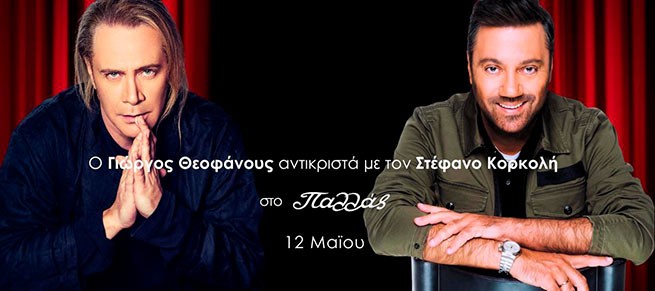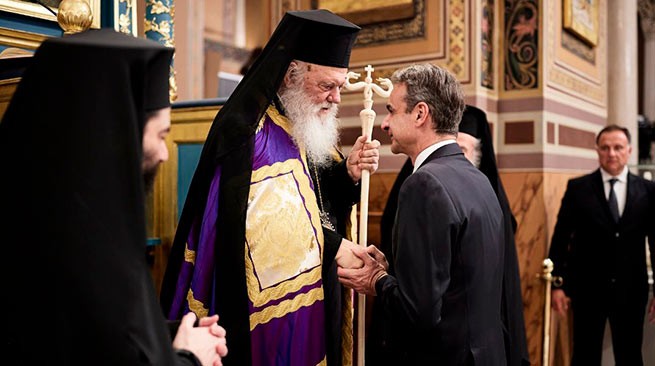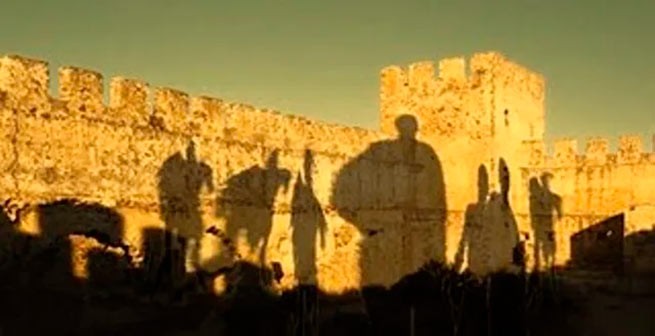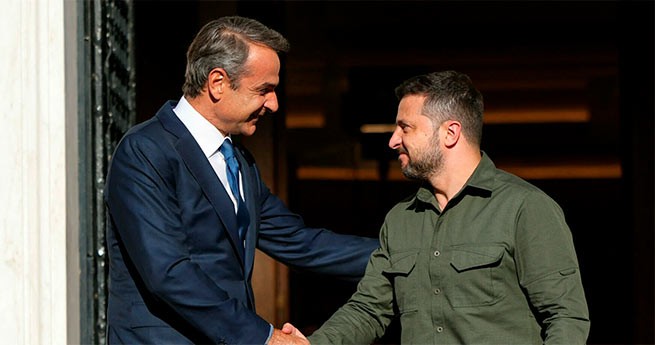Only 17% of Greek citizens are in favor of helping Ukraine, which is a telling figure when it comes to the ongoing war in Eastern Europe, while the government is preparing new supplies of weapons for the Ukrainian Armed Forces.
After more than two years spent on the battlefield and an ongoing war with no sign of peace, European citizens are showing fatigue regarding continued aid to Ukraine, with Greece and Hungary having the highest rates against aid. In particular, only 17% of Greeks consider continued assistance EU Ukraine is a priority, while 45% believe that this issue is of secondary importance. These figures are lower only in Hungary, which is significantly below the European average.
Only 36% of Europeans want help for Ukraine to be a priority for the next European Parliament, according to an exclusive IPSOS poll for Euronews – the first of its kind, involving almost 26,000 respondents from 18 EU countries.
Should the EU continue to support Ukraine?
Most of the respondents of an exclusive poll for Euronews by #IPSOS say support to Ukraine should continue.
But they are in two minds about whether it should be a priority for the next mandate. pic.twitter.com/oaKN7nLc28
— euronews (@euronews) March 29, 2024
Should the EU continue to support Ukraine? The majority of respondents to an exclusive #IPSOS poll conducted for Euronews believe that support for Ukraine should continue. But they disagree on whether it should be a priority for the next mandate.
Scandinavian EU member states are the most ardent supporters of continuing the war
Opinions about helping a war-torn country, however, vary greatly from country to country. Respondents from the EU's Nordic countries are among the most vocal supporters, calling on the next European Parliament to step up its support for Ukraine: 68% of Swedes, 59% of Danes and 57% of Finns said this was a priority for them.
At the opposite end – Greece and Hungary, followed by Romania and Slovakia. As for the countries that are among the largest donors of military assistance to Ukraine. Only 17% of Greeks and 12% of Hungarians believe that aid to Ukraine should be an EU priority in the next mandate. In Germany, Poland and the Czech Republic, where governments are among the largest donors of military aid to Ukraine, respondents appear to be feeling some aid fatigue, with percentages very similar to the EU average.
Part of the discontent in Eastern Europe and EU member states bordering Ukraine likely stems from imports of Ukrainian agricultural products, which European farmers are protesting, arguing they are driving down prices across the bloc.
Political ideology
The poll also looks at respondents' political ideology, with Green supporters (57%) overwhelmingly saying increasing support would be a priority over the next five years.
Respondents who identify themselves with the three main political groups in the European Parliament – the centre-right European People's Party, the centre-left Socialists and Democrats, and the centrist Renewal groups – also overwhelmingly favor continued active support for Ukraine.
Support from voters on the left is more muted, but still largely positive. However, the majority of respondents belonging to the right-wing group “Identity and Democracy” consider assistance to Ukraine to be of secondary importance.
The survey does not differentiate between different types of assistance. The EU has been providing military, macroeconomic and humanitarian assistance to Ukraine since Russia launched a full-scale invasion more than two years ago.
Does EU aid really help Ukraine?
When asked whether the EU's position on Ukraine has had a positive impact on developments in the war-torn country, respondents from 18 countries were evenly split, with the Greeks again giving a negative rating at just 22%.
Overall, 36% of respondents believe that the EU has had a positive impact, 32% that the bloc's impact has been neither positive nor negative, and the remaining 31% believe that the impact has been negative.
The total amount of aid from 27 member states exceeded 143 billion euros
According to data published by the Council of the European Union, the total amount of aid provided to Ukraine by 27 member states exceeds 143 billion euros! Of this, 81 billion euros were allocated from the EU budget for financial, economic and humanitarian support, and another 12 billion euros were provided by member states for the same purposes. Military aid amounts to €33 billion – two thirds in bilateral support and the remaining €11 billion from the European Peace Fund, while €17 billion is allocated to support refugees in the EU.
Since March 2022, more than four million Ukrainian refugees have found refuge in the EU. Their protection and basic needs, including health care, children's education and housing, are ensured by the temporary protection system.
The EU has also adopted a series of sweeping and unprecedented sanctions against Russia for its military offensive against Ukraine. Thirteen packages of measures were adopted, restricting the sale of Russian fossil fuels and metals, and severely limiting access to key goods and technologies that it can use on the battlefield. In addition, more than 300 billion euros from the Russian Central Bank were frozen in all EU countries and allies. G7.
Respondents from the Nordic countries – 63% of Danes, 60% of Finns, 58% of Swedes – positively assess the influence of the EU in supporting Ukraine. The Franco-German Axis, meanwhile, is moderately satisfied: 37% of French respondents have a positive opinion and 31% a negative one, about the same as across the Rhine. But in Romania, Slovakia, Italy, Austria, Greece and Hungary, majorities believe that the EU's influence on the war in Ukraine was ineffective.







More Stories
What blew up the Crimean Bridge in 2022
There will be no forced return of Ukrainian men from abroad; the e-office for those liable for military service will start working on May 18
Will Europe forcibly return Ukrainian draft dodgers?